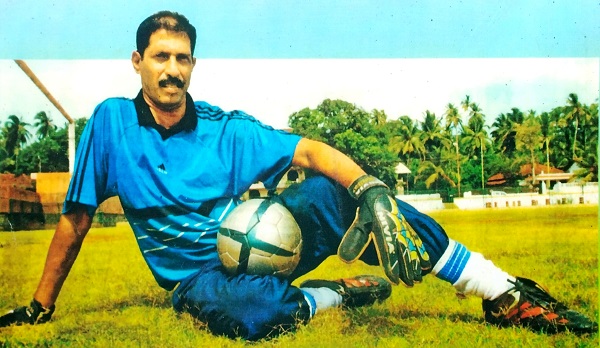
Brahmanand Sagun Kamat Sankhwalkar was born on March 6, 1954. He is the youngest among the ten siblings. His ancestors were originally from Sancoale, who moved to Veling Gothan near Mardol with their Goddess to avoid persecution. Some of them settled in different places in Margao, Vasco, and Panaji. Since Panaji was a ward of Taleigão during the Portuguese era, some came to Taleigão. As most of his brothers played football, Brahma, as one of the Indian coaches called him, picked up football at five. Brahma's father, a goalkeeper who played in a dhoti, was the source of his zeal for taking up football.
Brahma received basic training from Dr. Alvaro Remigio Pinto, a physician, a next-door neighbour, and a football enthusiast who frequently trained youngsters from Taleigão. The doctor saw a spark in Brahma and began to teach him the nitty-gritty of goalkeeping. Soon, Brahma picked up other technical elements that helped him become Goa's most outstanding and India's finest goalkeeper, enjoying a stellar football career of over 25 years. Here is a summary of the interview I had taken from Brahma.
During school, he primarily lined up as a striker whenever he played near the Taleigão church (Adro da Igreja) or in the nearby field. Nobody wanted to be at the goalpost. Brahma took up that position on being persuaded, wedged between two stones. He won his first school match 2-1. The youngster was overwhelmed with feelings of satisfaction to be a goalie.
After the game, he received accolades from everyone, and at that point, Brahma decided that if he wanted to succeed in football, there was only one hardest and most punishing position the should play as a goalie.
Brahma's first game for a club occurred under very peculiar circumstances at Saligao in 1970. Panvel SC secretary Anthony Botelho sought a goalie for a friendly match. Brahma, who was just 16, was recommended to Botelho by his brother Vallabh, a forward player with Panvel SC. He showed up with his school shorts, jersey, and Vallabh's football boots. When Panvel trailed 2-1 in the match, Botelho asked Brahma to handle the goal post in the second half, despite the team defender saying to him, field this boy. They ultimately lost the game, but the outcome might have been worse if Brahma hadn't been at the goalpost. Botelho was impressed by Brahma's talent, who invited him to play another match for Panvel at Candolim.
They won, and Brahma received an accolade. A football enthusiast, Fr. Francisco 'Chico' Monteiro, a priest from Candolim, also admired his game and encouraged Brahma to take up the game in a big way.
Brahma had already signed for Clube Sao Miguel de Taleigão before appearing in those games. However, the Goa Football Association did not accept his club registration form since his signature was invalid, being a minor. His father signed a new form, and the goalkeeper signed a contract with Panvel SC in 1970. Brahma thought about quitting the sport as a science student to concentrate on his studies. But he persisted in the sport thanks to the encouragement of Botelho and his father.
Goa State Team chose him for the Santosh Trophy in 1973 at Ernakulam. The top Goan clubs were eyeing him so much that Dempo SC offered him a free scholarship for the Science stream at Dhempe College if he played for their club. However, Levino Dias, a Panvel player, and Botelho persuaded Brahma to remain at Panvel Club. The Taleigão boy was convinced after Botelho offered him the captain post. He soon led the team to victory in the Bandodkar Gold Trophy. That victory became Brahma's farewell gift for Panvel.
Later, Brahma joined Salgaocar FC in 1974 and won the top division in his first season. His career trajectory was on the upswing, and he quickly received a call to join the Indian youth national squad. Loyalty, not money, is his trademark. Despite having lucrative offers from Kolkata clubs Mohun Bagan twice and Mohammedan Sporting, he chose Salgaocar. His aim was for Goa to win the Santosh Trophy. The goalie later served as the team's captain and one of their longest-tenured players, playing for them for 17 seasons. Under his captaincy, Goa won the Santosh trophy in 1983-84.
Brahma was a crucial component of the Salgaocar team, which created a name for itself in the national arena in the second half of the 1980s. He played a vital role in the four Federation Cup final appearances between 1987 and 1990. They won the two championship games between 1988 and 1990.
He holds a record of playing in the Goa League Top Division with 25 years of illustrious goalkeeping. Given his achievements, Brahma is the first Goan footballer to become a recipient of the Arjuna Award in 1998. His contribution to Goan football will never be forgotten; as captain, he led Goa to their first Federation Cup and helped them inscribe a chapter in Indian football history. His significant contribution to Indian football was recognised by the government of India, which conferred on him the prestigious Padma Shree by President Ramnath Kovind in March 2022.
Wish you a good health and God’s choicest blessings. A happy 70th birthday Brahma!